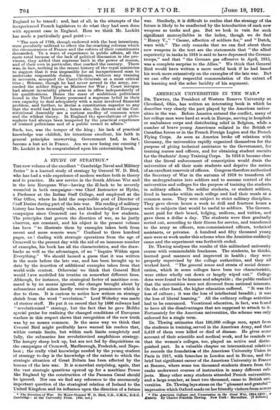A STUDY . OF STRATEGY.* TRH new volume of the excellent
" Cambridge Naval and Military Series " is a learned study of strategy by General W. D. Bird, who has had a wide experience of modern warfare both in theory and in practice. He saw service in the South African War and in the late European War—having the ill-luck to be severely wounded in both campaigns—was Chief Instructor at Hythe, a Professor at the Indian Staff College, and employed at the War Office, where he held the responsible post of Director of Staff Duties during part of the late war. His reading of military history has been unusually wide, and his knowledge of European campaigns since Cromwell can he rivalled by few students. The principles that govern the direction of war, as he justly observes, are constant, and his object in the present volume has been -" to illustrate them by examples taken both from recent and more remote wars." Confined to three hundred pages, an I dealing with strategic operations from the age of Cromwell to the present day with the aid of an immense number of examples, his book has all the characteristics, and the draw- backs as well as the advantages, of an " Inquire Within upon Everything." We should hazard a guess that it was written in the main before the late war, and has been brought up to date by the insertion' of additional examples taken from that world-wide contest. Otherwise- we think that General Bird would have modelled his treatise on somewhat different lines. Although, for instance, the strategical factor of maritime com- mand is by no means ignored, the changes brought about by submarines and mines hardly receive the prominence which is due to them. It is curious to notice how writers on strategy shrink from the word " revolution." Lord Wolseley was made of sterner stuff. He put it on record that by 1886 railways had " revolutionized " strategy, but the fact that he gave Moltke special praise for realizing the changed conditions of European warfare in this respect shows that recognition of the new truth was by no means common. In the same way we think that General Bird might profitably have warned his readers that, within certain limits, but within such limits completely and fully, the submarine has revolutionized amphibious strategy. The hungry sheep lookup, but are not fed by disquisitions on the campaigns of Cromwell, Marlborough, Frederick, and Napo- leon ; the really vital knowledge needed by the young student of strategy to-day is the knowledge of the extent to which the strategic situation of Great Britain has been affected by the lessons of the late war. It is scmewhat surprising, again, that the vast strategic questions opened up for a maritime Power like England by the construction of the Panama Canal should be ignored. Nor can we find any reference to the enormously important question of the strategical relation of Ireland to the United Kingdom and its influence upon the direction of a future • The Direction of War. By Major-General W. D. Bird, C.B— C.NLG.; D.S.O. Csmbridse: at the University Preen. [40a. net.]
war. Similarly, it is difficult to realize that the strategy of the future is likely to be unaffected by the introduction of such new weapons as tanks and gas. But we look in vain for such significant monosyllables in the index, though we do find " Henry V.," " Caesar, affection of soldiers for," and " Dutch, wars with." The only remarks that we can find about these new weapons in the text are the statements that " the allied superiority in _tanks in 1918 is said to have depressed the German troops," and that "the German gas offensive in April, 1915, was a complete surprise to the Allies." We think that General Bird would have written a more useful book if he had based his work more extensively on-the examples of the late war. But we can offer only respectful commendation of the extent of his learning and the sober lucidity of his argument.


































 Previous page
Previous page